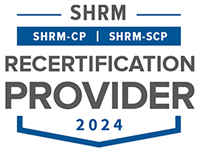
The use of this seal confirms that this activity has met HR Certification Institutes (HRCI) criteria for recertification credit pre-approval.
This activity has been approved for
1.5 HR
(General) recertification credit hours toward aPHR, PHR, PHRca, SPHR, GPHR, PHRi and SPHRi recertification through HR Certification Institute (HRCI). Please make note of the activity ID number on your recertification application form. For more information about certification or recertification, please visit the HR Certification Institute website at www.hrci.org." ...more
 Traininng.com LLC is recognized by SHRM to offer Professional Development Credits (PDCs) for the SHRM-CP® or SHRM-SCP®.
?
Traininng.com LLC is recognized by SHRM to offer Professional Development Credits (PDCs) for the SHRM-CP® or SHRM-SCP®.
?
1-hour educational program = 1 PDC.
1-hour and 15 minute concurrent conference session = 1.25 PDCs.
3-hour e-learning course = 3 PDCs.
Overview
Among the many types of charges to investigate are those alleging discrimination, harassment, and bullying. Regardless of which one, all should require a professionally written report documenting not only your findings of fact but that your investigation was done objectively, and in a timely manner.
So, you need to be prepared to not just conduct a proper investigation but to also show that you did. That means your report must be beyond reproach so it can withstand any appeal or challenge which may negatively reflect upon the integrity and credibility of your investigation! If done right your report can help remedy/resolve the situation.
If done wrong, it all too often makes things worse. So, it pays to know how to do it right every step of the way.
In short, this webinar can help you and your organization understand demonstrate that you met the requirements to conduct an effective and professional investigation.
Let's face it, it is a minefield out there so it’s important to be able to show you knew what you were doing and did it well!
Why you should Attend
- How to structure and write a clear, concise, well-organized, objective, and credible investigation report from complaint to conclusion
- How to identify and use the models of proof/standards as a guide in your investigation report for issues of discrimination, harassment, and bullying (violence/threats)
- How to provide parties with an analysis of the facts, and conclusions and or recommendations. How and when to present your written investigation.
Areas Covered in the Session
- Establish the authority of the investigator and scope of investigation at the beginning of your investigative report
- The importance of writing an objective and credible investigation report from complaint to conclusion
- Structure of your investigative report · When and how to include in your report the standards/models of proof and how they were utilized in your investigation
- 10 steps to include in your report to establish an effective investigation for:
- Discrimination
- Harassment and
- Bullying (threats/violence)
- How to document your efforts to avoid legal minefields during your investigation efforts:
- Negligent (and deliberately negligent) Investigation
- Loudermill and Weingarten Rights
- Violation of Public Policy
- False light/Defamation
- False Imprisonment
- Intentional or Negligent Infliction of Emotional Distress
- Searches and Monitoring/Surveillance
Who Will Benefit
- All level Managers
- Supervisors
- Human Resources
- Employee Relations
- Labor Relations
- Attorney's
- And Union Officers/Representatives/Stewards
- All levels of Law Enforcement or Security staff
Speaker Profile
Bob Oberstein is uniquely qualified with over 50 years of Labor Relations experience on both sides of the table in both the private and public sectors where he conducted countless investigations. Bob was also the Director of the Labor Management Relations program at Ottawa University, Phoenix where he also served as Ombudsman for all student, faculty and staff complaints which often involved conducting internal investigations. Bob has several published articles to his credit in addition to his arbitration awards and has also been recognized in Who’s Who Among America’s Teachers.
Additionally, Bob served on several boards, commissions, and panels where he participated in resolving or adjudicating all manner of workplace issues in a variety of industries. In all these capacities as well as being both mediator and arbitrator Bob often reviewed investigations to determine if they had been properly performed and had merit.
Additionally, he has qualified as an MD-110 investigator for Title VII and other discrimination related charges as well as being a “Lifetime Certificate Holder” of the Association of Workplace Investigators. Moreover, Bob earned a Master of Jurisprudence in Labor and Employment Law from Tulane University's School of Law.
Bob continues to serve the labor management community as well as other groups as an Arbitrator, Mediator, Facilitator, Investigator, Trainer and Educator. Further details about Bob’s unique qualifications can be found on his LinkedIn profile at Linkedin.com/in/boberstein.

 Traininng.com LLC is recognized by SHRM to offer Professional Development Credits (PDCs) for the SHRM-CP® or SHRM-SCP®.
?
Traininng.com LLC is recognized by SHRM to offer Professional Development Credits (PDCs) for the SHRM-CP® or SHRM-SCP®.
?